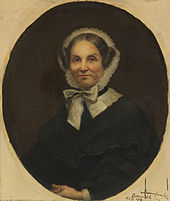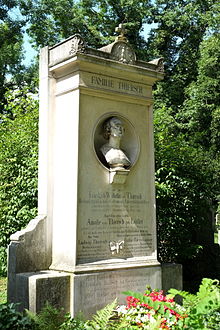Friedrich Thiersch
Friedrich Wilhelm von Thiersch (born June 17, 1784 in Kirchscheidungen near Freyburg as Friedrich Wilhelm Thiersch ; † February 25, 1860 in Munich ) was a German philologist , also known as the "Praeceptor Bavariae" (teacher of Bavaria ) and the "father of humanistic education “Was designated in Bavaria, similar to Wilhelm von Humboldt in Prussia .
One of his brothers was the poet of the Prussian song , Bernhard Thiersch . His sons were the surgeon Carl Thiersch , the theologian Heinrich Wilhelm Josias Thiersch and the painter Ludwig Thiersch . The architect and painter Friedrich von Thiersch was his grandson. The classical archaeologist Hermann Thiersch and the architect Paul Thiersch were his great-grandchildren.
Life
Thiersch was born as the second son of farmer Benjamin Thiersch in the Thuringian village of Kirchscheidungen an der Unstrut. He studied in Leipzig and Göttingen from 1804 and became a private lecturer there in 1808 . In 1809 he came to the Munich Wilhelmsgymnasium as a professor and in 1811 to the Lyceum .
Soon after his arrival in Munich, Thiersch got into an argument with his superiors at the grammar school and with the circles surrounding Baron Johann Christoph von Aretin . On the one hand, there was a conflict between the Protestant North and the Catholic South; On the other hand, there was disagreement as to whether one should continue to work with Napoleon's France , which Aretin particularly advocated, and whether one should abandon Enlightenment educational policy in order to turn to a new humanist education system. When an assassination attempt was made on Thiersch on Shrove Monday 1811, Thiersch put the blame on his opponents around Baron Aretin; in fact, a love affair was the reason for the attack.
In 1812 Friedrich Thiersch founded the Philological Institute connected to the Bavarian Academy of Sciences . From 1811 to 1829 he published the four-volume Acta philologorum Monacensium , the forum of the Philological Institute. After Ludwig I ascended the throne in 1825, Thiersch was commissioned to reorganize the higher education system. In the curriculum he wrote in 1829, teaching at grammar schools was almost entirely reduced to learning the ancient languages . This came close to the ideas of the king, who wanted to fuse his dynastic patriotism with a classicist ethos (see Walhalla ). In 1835 Thiersch was elected a foreign member of the Göttingen Academy of Sciences . From 1848 to 1859 he was President of the Bavarian Academy of Sciences . In 1855 he was elected to the American Academy of Arts and Sciences .
Friedrich Thiersch was awarded the Order of Merit of the Bavarian Crown in 1855 and was thus elevated to the personal nobility status as Friedrich Wilhelm Ritter von Thiersch . Friedrich Wilhelm von Thiersch died in Munich on February 25, 1860.
Further honors
Thiersch was among others
- Knight of the Order of Merit of St. Michael (1839), Grand Cross (1858)
- Bearer of the Red Eagle Order 3rd Class (1839)
- Grand Commander of the Greek Order of the Redeemer (1841)
- Knight of the Leopold Order (1842), Grand Cross (1858)
- Knight of the Bavarian Maximilian Order for Science and Art (1853)
- Commander of the Saxon Order of Albrecht (1860)
- Bearer of the Cross of Honor of the Bavarian Order of Ludwig
In Munich, Thierschstrasse (at the Wilhelmsgymnasium , between Isartorplatz and Lehel) is named after him. In Athens , Theirsiou Street ( Greek Θειρσίου ; 37 ° 59 ′ 52.7 ″ N, 23 ° 43 ′ 18.1 ″ E ) was named after him. The Bavarian Academy of Sciences dedicated a medal to Thiersch that was made by the medalist Johann Adam Ries and issued in 1860. The tomb of Friedrich Thiersch is on the old southern cemetery in Munich (burial ground 41 - Series 1 - Place 16) location .
Writings (chronological)
- About the assumed difference between North and South Germany , 1809
- Greek grammar, especially the Homeric dialect , 1812
- Greek grammar for schools , 1812
- On the poems of Hesiodus, their origin and connection with those of Homer , 1813
- On the epochs of the fine arts among the Greeks , 3 volumes, 1816–1825
- Praise to Carl Wilhelm Friedrich von Breyer , 1818
- The Processing of Pindar , 2 volumes, 1820
- About a Greek Gemma litterata in the possession of His Majesty the King , 1824
- Preliminary news from the k. Antiquarium in Munich residence , 1825
- About learned schools, with special consideration for Bavaria , 3 volumes, 1826–1829
- About modern Greek poetry, especially about its rhythmic and poetic relation to ancient Greek , 1828
- About the Cinctus Gabinus , 1829
- About a tabula honestae missionis in the K. [bayer.] Antiquarium , 1829
- About a still unedited, by the landscape painter Hn. A Christian-Greek epitaph brought to Carl Rottmanner from Sicily , 1829
- About the state of the University of Tübingen , 1830
- Unworthy failures at the University of Tübingen , 1830
- On the fate and needs of the Ludwig Maximilians University in Munich , 1830
- Comments on a relief edited by Winkelmann in the K. Antiquarium , 1831
- About a Patera Etrusca by K. Antiquarium , 1831
- De l'état actuel de la Grèce et des moyens d'arriver à sa restauration , 2 volumes, 1833
- Ludovico Primo Bavariae regi ... et Theresae reginae ... tori genialis quinque lustra feliciter practa pie gratulatur Universitas Ludovico-Maximilianes Monacensis , 1835
- On the Latest Attacks on the Universities , 1837
- Memorial speech for Georg Friedrich because. Freyherrn von Zentner , 1837
- On the Dramatic Nature of Platonic Dialogues , 1837
- On the Present State of Public Education in the Western States of Germany, Holland, France and Belgium , 3 volumes, 1838
- On the topography of Delphi , 1840 ( digitized )
- On the Relationship between Philology and Classical Studies in Our Time , 1840
- On Protestantism and knee flexion in Bavaria , 1844
- About the Hellenic painted vases , 1844
- General Aesthetics in Academic Teaching Lectures , 1846
- Apology of a Philhellenic against Prince Hermann LG v. Pückler , 1846
- Speech at the beginning of the rector's office at the Ludwig-Maximilians-Universität , 1847
- Sicilian sonnets from 1845 , 1848
- Speech to the Vorfeyer of the high birth festival of Sr. Majesty of King Maximilian II , 1849
- On the practical side of scientific activity , 1849
- Viro amplissimo illustrissimo doctissimo Friderico de Thiersch ... de gymnasiis Bavariae eorumque praeceptoribus optime merito post mandatos summos in philosophia honores XVIII. the junii a. MDCCCLVIII decem lustra egregia cum laude peracta laetis animis piisque votis gratulantur Gymnasii Ludoviciani rector et professores , 1858
- Commemoration for the fiftieth doctor anniversary of the secret councilor Friedrich von Thiersch on June 18, 1858 , 1858
- Friedrich Thiersch's life (from his letters) , edited by HWJ Thiersch, 2 volumes, 1866
literature
- Georg Martin Thomas: Memorial speech on Friedrich von Thiersch : delivered at the public meeting of the k. Academy of Sciences on November 28, 1860 as the very highest birthday of His Majesty the King Maximilian II of Bavaria, Verlag G. Franz, 1860 [1]
- Heinrich Wilhelm Josias Thiersch, Friedrich Wilhelm von Thiersch: Friedrich Thierschs Leben , 2 volumes, Verlag CF Winter, 1866.
- August Baumeister : Thiersch, Friedrich Wilhelm . In: Allgemeine Deutsche Biographie (ADB). Volume 38, Duncker & Humblot, Leipzig 1894, pp. 7-17.
- Hans-Martin Kirchner : Friedrich Thiersch. A liberal cultural politician and philhellene in Bavaria . Publications of the Institute for the History of Eastern Europe and South Eastern Europe at the University of Munich, Volume 16. Hieronymus, Munich 1996, 422 pages, ISBN 3-928286-20-X .
- Friedrich Hoppe : From the youth of a famous church diviner , (Friedrich Wilhelm Thiersch), In: Naumburger Heimat , No. 22, (June 10, 1931)
- Günter Wirth : The Thiersch family from Kirchscheidungen near Naumburg, their way into the performance and responsibility elite in Germany , Saale-Unstrut yearbook 2010, yearbook for cultural history and natural history of the Saale-Unstrut region, published by the Saale-Unstrut association for cultural history und Naturkunde eV 15th year, p. 75 ff.
- Peter Aufgebauer : jubilation - protest - philology: the establishment of the "Association of German Philologists and School Men" in Göttingen in 1837. In: Niedersächsisches Jahrbuch für Landesgeschichte , Vol. 82, 2010, pp. 95–110.
Web links
- Literature by and about Friedrich Thiersch in the catalog of the German National Library
- Works by and about Friedrich Thiersch in the German Digital Library
- Friedrich Thiersch in the Bavarian literature portal (project of the Bavarian State Library )
- Rolf Selbmann and Peter Kefes: Friedrich Thiersch and the new humanism in old Bavaria. Truth and legend
- A large number of digitized, copyright-free works by and about Friedrich Thiersch can be found in the digital collections of the Bayerische Staatsbibliothek [2] : Simply enter "Thiersch" in the search field above.
- Estate: Letters on the Politics of Greece 1821–1841 ( BSB Thierschiana I.63.Ig)
- The extensive estate is in the Bavarian State Library
Individual evidence
- ↑ Holger Krahnke: The members of the Academy of Sciences in Göttingen 1751-2001 (= Treatises of the Academy of Sciences in Göttingen, Philological-Historical Class. Volume 3, Vol. 246 = Treatises of the Academy of Sciences in Göttingen, Mathematical-Physical Class. Episode 3, vol. 50). Vandenhoeck & Ruprecht, Göttingen 2001, ISBN 3-525-82516-1 , p. 239.
- ↑ Carl Heinrich Csapari: Speech at the funeral of Mr. Friedr. Wilh. v. Thiersch, etc. on February 27, 1860
- ↑ Evi Melas: Travel correctly. Greece. , 12th edition Cologne 1990, p. 78.
- ↑ Stefan Krmnicek, Marius Gaidys: Taught images. Classical scholars on 19th century medals. Accompanying volume to the online exhibition in the Digital Coin Cabinet of the Institute for Classical Archeology at the University of Tübingen (= From Croesus to King Wilhelm. New Series, Volume 3). Tübingen University Library, Tübingen 2020, pp. 86–88 ( online ).
| predecessor | Office | successor |
|---|---|---|
| Maximilian von Freyberg-Eisenberg |
President of the Bavarian Academy of Sciences from 1848 to 1859 |
Justus Freiherr von Liebig |
| personal data | |
|---|---|
| SURNAME | Thiersch, Friedrich |
| ALTERNATIVE NAMES | Thiersch, Friedrich Wilhelm; Thiersch, Friedrich Wilhelm Ritter von (full name, from 1855) |
| BRIEF DESCRIPTION | German philologist |
| DATE OF BIRTH | June 17, 1784 |
| PLACE OF BIRTH | Church divisions near Freyburg |
| DATE OF DEATH | February 25, 1860 |
| Place of death | Munich |




